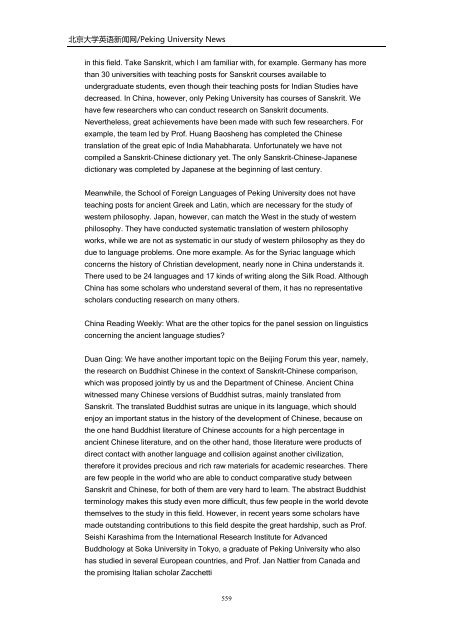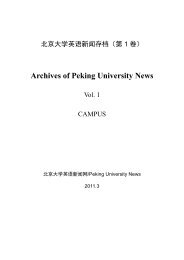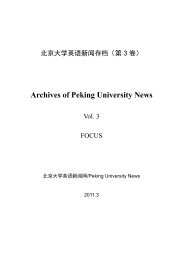Archives of Peking University News - PKU English - 北京大学
Archives of Peking University News - PKU English - 北京大学
Archives of Peking University News - PKU English - 北京大学
Create successful ePaper yourself
Turn your PDF publications into a flip-book with our unique Google optimized e-Paper software.
<strong>北京大学</strong>英语新闻网/<strong>Peking</strong> <strong>University</strong> <strong>News</strong><br />
in this field. Take Sanskrit, which I am familiar with, for example. Germany has more<br />
than 30 universities with teaching posts for Sanskrit courses available to<br />
undergraduate students, even though their teaching posts for Indian Studies have<br />
decreased. In China, however, only <strong>Peking</strong> <strong>University</strong> has courses <strong>of</strong> Sanskrit. We<br />
have few researchers who can conduct research on Sanskrit documents.<br />
Nevertheless, great achievements have been made with such few researchers. For<br />
example, the team led by Pr<strong>of</strong>. Huang Baosheng has completed the Chinese<br />
translation <strong>of</strong> the great epic <strong>of</strong> India Mahabharata. Unfortunately we have not<br />
compiled a Sanskrit-Chinese dictionary yet. The only Sanskrit-Chinese-Japanese<br />
dictionary was completed by Japanese at the beginning <strong>of</strong> last century.<br />
Meanwhile, the School <strong>of</strong> Foreign Languages <strong>of</strong> <strong>Peking</strong> <strong>University</strong> does not have<br />
teaching posts for ancient Greek and Latin, which are necessary for the study <strong>of</strong><br />
western philosophy. Japan, however, can match the West in the study <strong>of</strong> western<br />
philosophy. They have conducted systematic translation <strong>of</strong> western philosophy<br />
works, while we are not as systematic in our study <strong>of</strong> western philosophy as they do<br />
due to language problems. One more example. As for the Syriac language which<br />
concerns the history <strong>of</strong> Christian development, nearly none in China understands it.<br />
There used to be 24 languages and 17 kinds <strong>of</strong> writing along the Silk Road. Although<br />
China has some scholars who understand several <strong>of</strong> them, it has no representative<br />
scholars conducting research on many others.<br />
China Reading Weekly: What are the other topics for the panel session on linguistics<br />
concerning the ancient language studies?<br />
Duan Qing: We have another important topic on the Beijing Forum this year, namely,<br />
the research on Buddhist Chinese in the context <strong>of</strong> Sanskrit-Chinese comparison,<br />
which was proposed jointly by us and the Department <strong>of</strong> Chinese. Ancient China<br />
witnessed many Chinese versions <strong>of</strong> Buddhist sutras, mainly translated from<br />
Sanskrit. The translated Buddhist sutras are unique in its language, which should<br />
enjoy an important status in the history <strong>of</strong> the development <strong>of</strong> Chinese, because on<br />
the one hand Buddhist literature <strong>of</strong> Chinese accounts for a high percentage in<br />
ancient Chinese literature, and on the other hand, those literature were products <strong>of</strong><br />
direct contact with another language and collision against another civilization,<br />
therefore it provides precious and rich raw materials for academic researches. There<br />
are few people in the world who are able to conduct comparative study between<br />
Sanskrit and Chinese, for both <strong>of</strong> them are very hard to learn. The abstract Buddhist<br />
terminology makes this study even more difficult, thus few people in the world devote<br />
themselves to the study in this field. However, in recent years some scholars have<br />
made outstanding contributions to this field despite the great hardship, such as Pr<strong>of</strong>.<br />
Seishi Karashima from the International Research Institute for Advanced<br />
Buddhology at Soka <strong>University</strong> in Tokyo, a graduate <strong>of</strong> <strong>Peking</strong> <strong>University</strong> who also<br />
has studied in several European countries, and Pr<strong>of</strong>. Jan Nattier from Canada and<br />
the promising Italian scholar Zacchetti<br />
559




